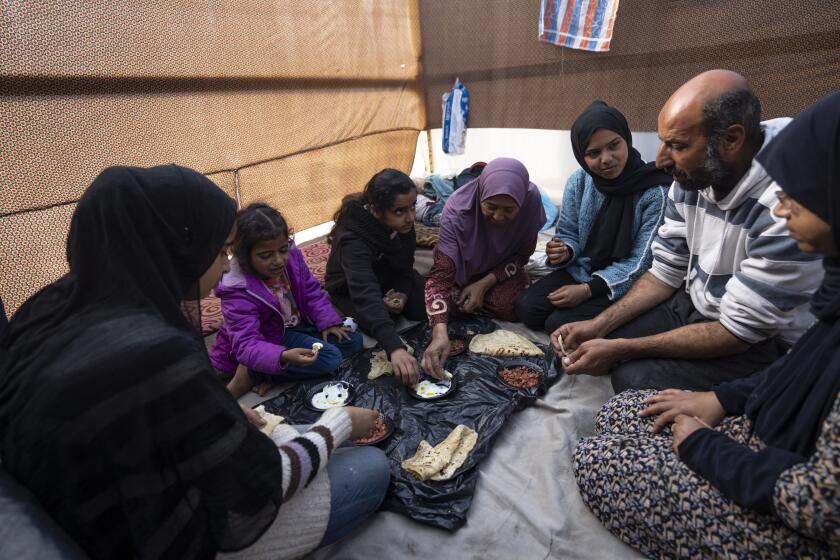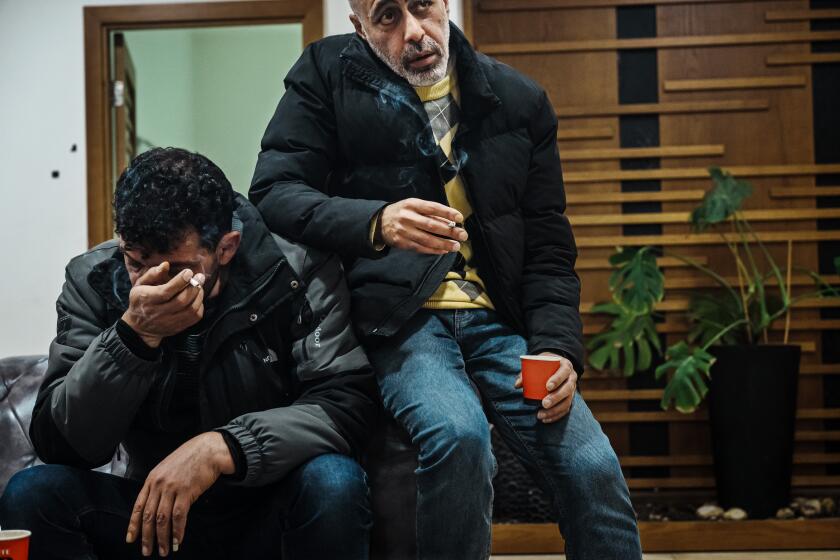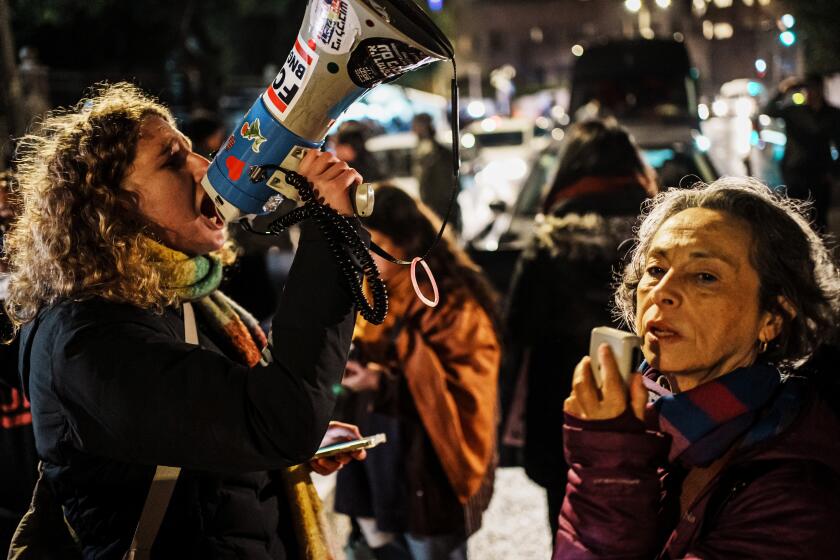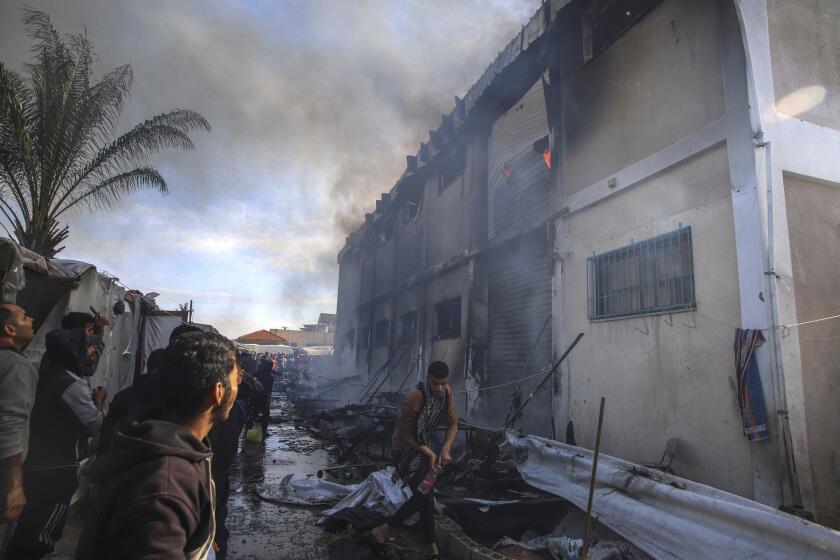Biden OKs airdrops of Gaza aid after chaotic encounter with Israeli troops left at least 115 dead
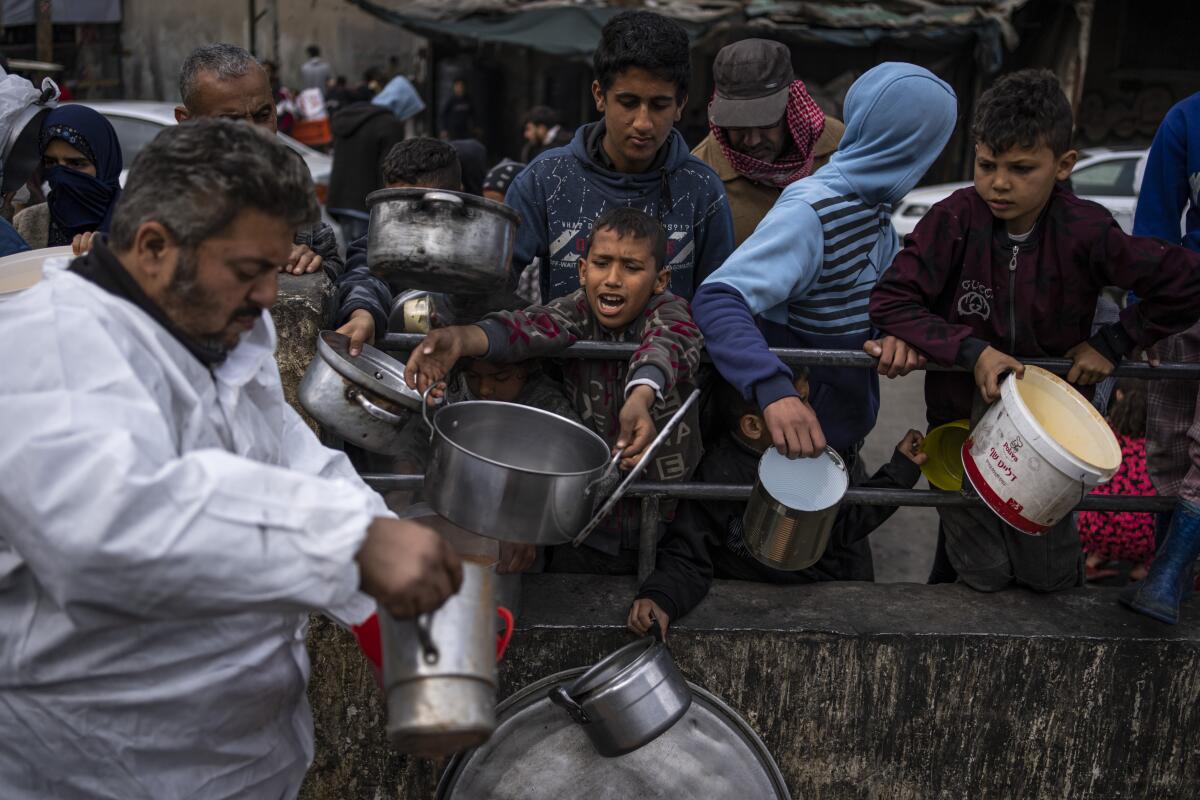
- Share via
The U.S. will begin airdropping humanitarian assistance into Gaza, President Biden said Friday, a day after more than 100 Palestinians were killed during a chaotic encounter with Israeli troops.
The president announced the move after at least 115 Palestinians were killed and more than 750 injured Thursday in the civilian disaster in Gaza City, according to the health ministry in the Hamas-run Gaza Strip. Witnesses said Israeli troops opened fire as crowds raced to pull goods off an aid convoy.
Biden said the air drops would begin soon and that the United States was looking into additional ways to facilitate getting aid into the war-battered territory to ease the suffering of Palestinians.
“In the coming days, we’re going to join with our friends in Jordan and others who are providing airdrops of additional food and supplies,” Biden said, and will “seek to open up other avenues in, including possibly a marine corridor.”
Israel said many of the dead Thursday were trampled in a stampede linked to the aid convoy and that its troops fired at some in the crowd who they believed moved toward them in a threatening way.
But the head of a Gaza City hospital that treated some of the wounded said Friday that more than 80% had been struck by gunfire, suggesting there had been heavy shooting by Israeli troops.
Dr. Mohammed Salha, the acting director of Al Awda Hospital, told the Associated Press that 176 wounded were brought to the facility, of whom 142 had gunshot wounds. The others showed injuries consistent with a stampede.
Among the fatalities, he couldn’t address the cause of death, because the bodies were taken to government-run hospitals to be counted.
Dr. Hussam Abu Safyia, director of Kamal Adwan Hospital, said the majority of the injured there had gunshot wounds in the upper part of the body, and many of the deaths were from gunshots to the head, neck or chest.
Palestinians seeking refuge in southern Gaza say every day has become a desperate struggle to find food, water, medicine and working bathrooms.
The bloodshed underscored how chaos amid the five-month war has crippled the effort to bring aid to Gaza’s 2.3 million Palestinians, a quarter of whom face starvation, the United Nations says.
The U.N. and other groups have been pleading for safe corridors for aid convoys, saying it has become nearly impossible to deliver supplies to most of Gaza because of the difficulty of coordinating with the Israeli military, ongoing hostilities and the breakdown of public order, with crowds of desperate people overwhelming convoys.
U.N. officials say hunger is worst in northern Gaza, where several hundred thousand Palestinians remain though the area has been isolated and mostly leveled since Israeli troops launched a ground offensive there in late October. U.N. agencies haven’t delivered aid to the north in more than a month because of military restrictions and lack of security, but several deliveries by other groups reached the area this week.
Aid officials have said airdrops are an incredibly expensive way of distributing assistance.
“I don’t think the airdropping of food in the Gaza Strip should be the answer today,” Philippe Lazzarini, head of the U.N. agency for Palestinian refugees, said Thursday. “The real answer is open the crossing and bring convoys and bring meaningful assistance into the Gaza Strip.”
With family trapped in Gaza, two Palestinian friends in the West Bank hold each other up amid crushing grief.
Thursday’s convoy wasn’t organized by the U.N. It appeared to have been monitored by the Israeli military, which said its troops were on hand to ensure the aid reached northern Gaza. The ensuing shooting raises questions over whether Israel will be able to keep order if it goes through with its postwar plans for Gaza.
Prime Minister Benjamin Netanyahu has put forward a plan under which Israel would retain open-ended security and political control over the territory — an effective reoccupation — after Hamas is destroyed. Under the plan, Palestinians chosen by Israel would administer the territory; however, it’s uncertain if any would cooperate.
That would leave Israeli troops, who throughout the war have responded with heavy firepower when they perceive a possible threat, to oversee the population amid what the international community says must be a massive postwar humanitarian and reconstruction operation.
Israel launched its air, sea and ground war in Gaza in response to Hamas’ Oct. 7 attack, in which militants killed around 1,200 people, mostly civilians, and abducted around 250.
More than three months into the Israel-Hamas war, the families of hostages held in Gaza have grown disillusioned with Israel’s military operations.
Since the assault in Gaza began, Israel has barred entry of food, water, medicine and other supplieson the already long-blockaded Gaza Strip, except for a trickle of aid entering the south from Egypt at the Rafah crossing and Israel’s Kerem Shalom crossing.
Despite international calls to allow more aid to enter, there are far fewer supply trucks than the 500 that came daily before the war.
The Gaza Health Ministry said Israel’s bombardments and ground assaults have killed 30,228 Palestinians and wounded 71,377. The ministry doesn’t differentiate between civilians and combatants in its figures but says women and children make up around two-thirds of those killed.
Thursday’s bloodshed took place as a convoy of about 30 trucks entered Gaza City before dawn.
Kamel Abu Nahel, who was being treated for a gunshot wound at Shifa Hospital, said he and others went to the distribution point in the middle of the night because they heard there would be a delivery of food.
“We’ve been eating animal feed for two months,” he said.
He said Israeli troops opened fire as people pulled boxes of flour and canned goods off the trucks, causing the Palestinians to scatter or hide under cars.
After the shooting stopped, people went back to the trucks, and the soldiers opened fire again, Nahel said. He was shot in the leg, then a truck ran over his leg as it sped off, he said.
The International Court of Justice’s ruling comes at an early stage in South Africa’s case alleging that Israel’s actions in Gaza amount to genocide.
The Israeli military said dozens of the deaths were caused by a stampede, and some of those killed were run over by trucks as drivers tried to get away.
Rear Adm. Daniel Hagari, the chief military spokesperson, said Israeli troops guarding the area fired shots “only toward a threat after the crowd moved toward them in a way that endangered them.” He said the troops “didn’t open fire on those seeking aid.”
Saudi Arabia, Egypt and Jordan accused Israel of targeting civilians. In separate statements, they called for increased safe passages for humanitarian aid. They also urged the international community to take decisive action to pressure Israel to abide by international law and reach an agreement for an immediate cease-fire.
Biden said Thursday’s bloodshed could set back cease-fire efforts. The U.S., Egypt and Qatar have been working to secure a deal between Israel and Hamas for a pause in fighting and the release of some of the hostages Hamas took Oct. 7. After a round of releases during a weeklong cease-fire in November, about 130 hostages remain captive in Gaza, though Israel says a quarter of them are believed to be dead.
Mediators hope to reach an agreement before the Muslim holy month of Ramadan starts around March 10. So far, Israel and Hamas have remained far apart in public on their demands.
The war in Gaza has shattered the territory’s fragile mental health services — at a time when people need them most.
Biden, who made the announcement on humanitarian airdrops while hosting Italian Prime Minister Giorgia Meloni at the White House, said, “Aid flowing to Gaza is nowhere nearly enough. Now, it’s nowhere nearly enough. Innocent lives are on the line, and children’s lives are on the line. We won’t stand by until we get more aid in there. We should be getting hundreds of trucks in, not just several.”
The White House, State Department and Pentagon had been weighing the merits of U.S. military airdrops of assistance for several months but held off due to concerns that the method is inefficient, has no way of ensuring that the aid gets to civilians in need and cannot make up for overland aid deliveries.
Administration officials said their preference was to increase overland aid deliveries through the Rafah and Kerem Shalom border points and to try to get Israel to open the Erez Crossing into northern Gaza.
Thursday’s incident appeared to tip the balance and push Biden to approve airdrops. White House national security spokesman John Kirby said airdrops are difficult operations, but the acute need for aid in Gaza informed the president’s decision. He stressed that ground routes will continue to be used to get aid into Gaza and that the airdrops are a supplemental effort.
“It’s not the kind of thing you want to do in a heartbeat. You want to think it through carefully,” Kirby said. “There’s few military operations that are more complicated than humanitarian assistance airdrops.”
Pressure has been mounting for Biden, including from his own party, to move more aggressively to ease Palestinian suffering. Even before Thursday’s deaths, Sen. Jack Reed (D-R.I.), chairman of the Senate’s Armed Services Committee, wrote Biden this week to urge that the administration deploy a military hospital ship and support units to help treat Gaza’s wounded and open a sea route for delivery of humanitarian aid.
“Yesterday’s event, I think, underscores the need to find more creative ways of getting assistance in faster and at greater scale,” Kirby said.
Egypt, France, Jordan, Qatar and the United Arab Emirates have used airdrops to get aid into Gaza since the conflict began in October.
Associated Press reporters Miller and Madnahi reported from Washington, Shurafa from Rafah and Mroue from Beirut. AP writer Seung Min Kim aboard Air Force One contributed.
More to Read
Sign up for Essential California
The most important California stories and recommendations in your inbox every morning.
You may occasionally receive promotional content from the Los Angeles Times.
